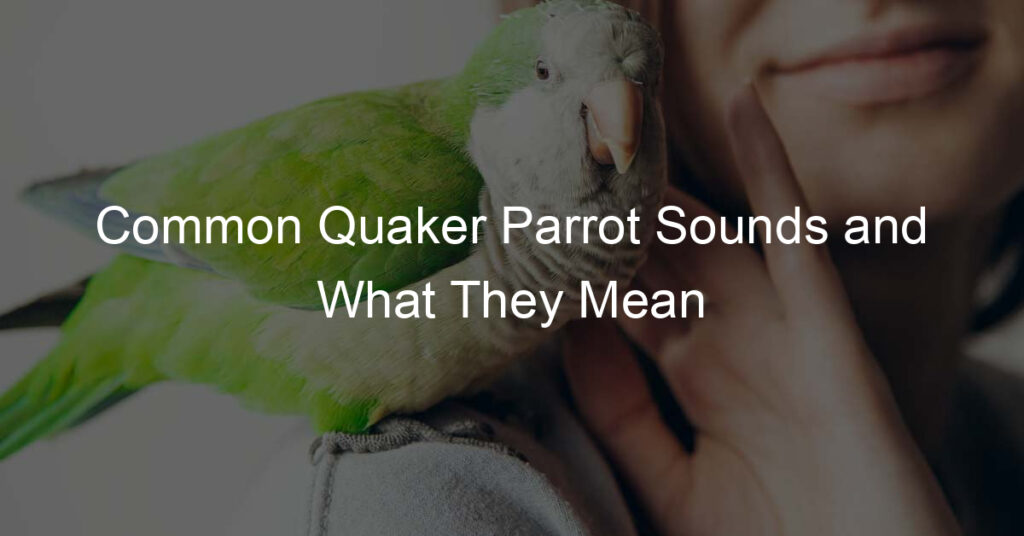If you’ve ever heard a Quaker parrot vocalize, you know that they can make quite a variety of sounds. But what do these different sounds mean? In this blog post, we’ll explore some of the most common Quaker parrot sounds and what they might signify.
Read on to learn more about your feathered friend’s unique form of communication!
Why is my Quaker parrot making noises?
There are many reasons why my Quaker parrot might be making noises. They may be trying to communicate something specific, such as hunger or a desire for attention.
It could also simply be that they are feeling playful and expressing themselves in some way; birds and other animals have been known to vocalize for the pleasure of it.
It is important, however, to observe how my Quaker parrot behaves when it talks and take note of any changes in its behavior to ensure that everything is all right – after all, even babble can sometimes mean something important.
What do my parrot noises mean?
Trying to figure out what your parrot is saying can be confusing but also fun. With time and practice, you can learn to understand the noises they make and why they make those noises in certain situations.
For example, some parrots may chirp when they are excited while others may squawk loudly when they’re scared.
Body language is also a big indicator of how your parrot is feeling and can help add context to the noises they make. So take some time with your feathered friend – watch, listen, and observe – and you’ll soon have your very own version of Parrot Speak!
How do you know if a parrot likes you?
One way to tell if a parrot likes you is through its body language. If your parrot trusts you, it may become relaxed and spread out its feathers in a way that indicates contentment. You may also notice other subtle measures, such as when it eyes your hands for potential threats.
Additionally, if you’ve taken the time to get to know your parrot, it may respond positively when you talk with it or gesture at it. Mutual respect and affection are key components of earning a parrot’s friendship and developing a bond between the two of you.
Ultimately, there’s no surefire way to guarantee that a parrot will like you – but if you take the time to understand and care for your feathered friend, there’s a good chance that the two of you can develop a strong friendship.
What noise does a parrot make when it is upset?
When a parrot is feeling distressed or agitated, it can produce a variety of ear-piercing squawks. These noises can be loud enough to startle people; flapping wings often accompany them as the parrot attempts to draw attention to itself to feel safe.
Parrots will also sometimes make muffled chirping noises if they feel insecure, perhaps as a way of calming themselves down.
Ultimately, the best way to assess how a parrot is feeling is by observing its behavior and body language. A parrot’s vocalizations are always worth noting, but other factors must be taken into consideration for an accurate overall assessment.
What is the easiest word for a parrot to say?
Believe it or not, the easiest word for a parrot to say is its name!
Parrots are very intelligent birds and have impressive memories and strong voices, allowing them to learn various words with ease. Most parrot owners discover that the first word their pet parrot picks up on is typically its name.
From there, they can begin to expand their vocabulary by learning new words like ‘hello’ or ‘goodbye’.
Although it may take a little patience, teaching a parrot new words can be an incredibly rewarding experience — plus, what better way to show your feathered friend some love than by gifting them with the identity of their very own name?
Final Thoughts: Common Quaker Parrot Sounds and What They Mean
Overall, Quaker parrots can communicate their emotions to us through different vocalizations. Understanding the meanings of these sounds and variations can help us give the birds better care and allow us to know if something is wrong based on changes in their behavior or vocalizations.
It’s important to regularly monitor your bird to pick up on any subtle changes or patterns, as well as any new noises they make.
If you’ve noticed any strange or suspicious sounds coming from your bird, it’s best to err on the side of caution and take them in for a professional opinion just to be sure they are ok.
Overall, Quaker parrots are incredibly intelligent creatures with an immense capacity for communication.
Learning how to interpret their vocalizations is one of the biggest keys to establishing a strong relationship with them and providing them with excellent care. Now that you better understand Quaker parrot sounds, go forth and enjoy your birds!








